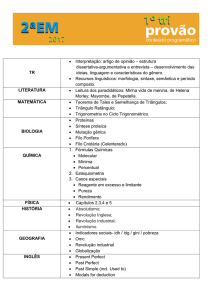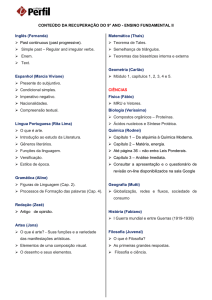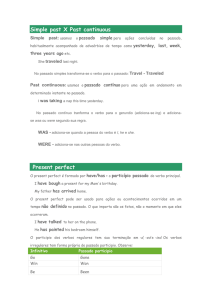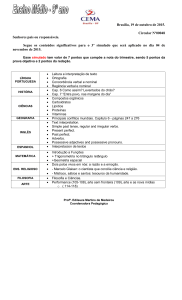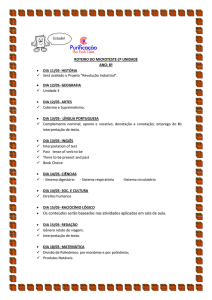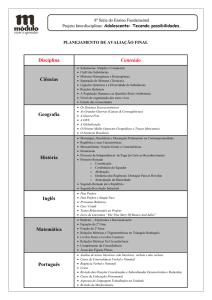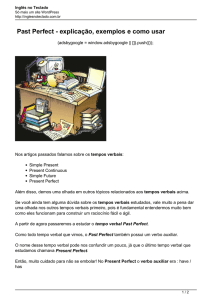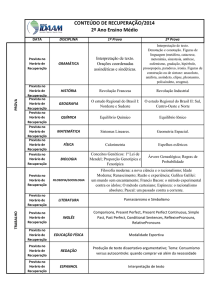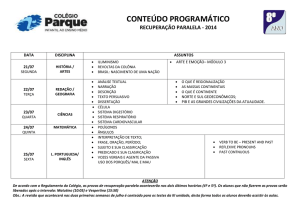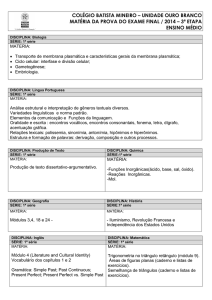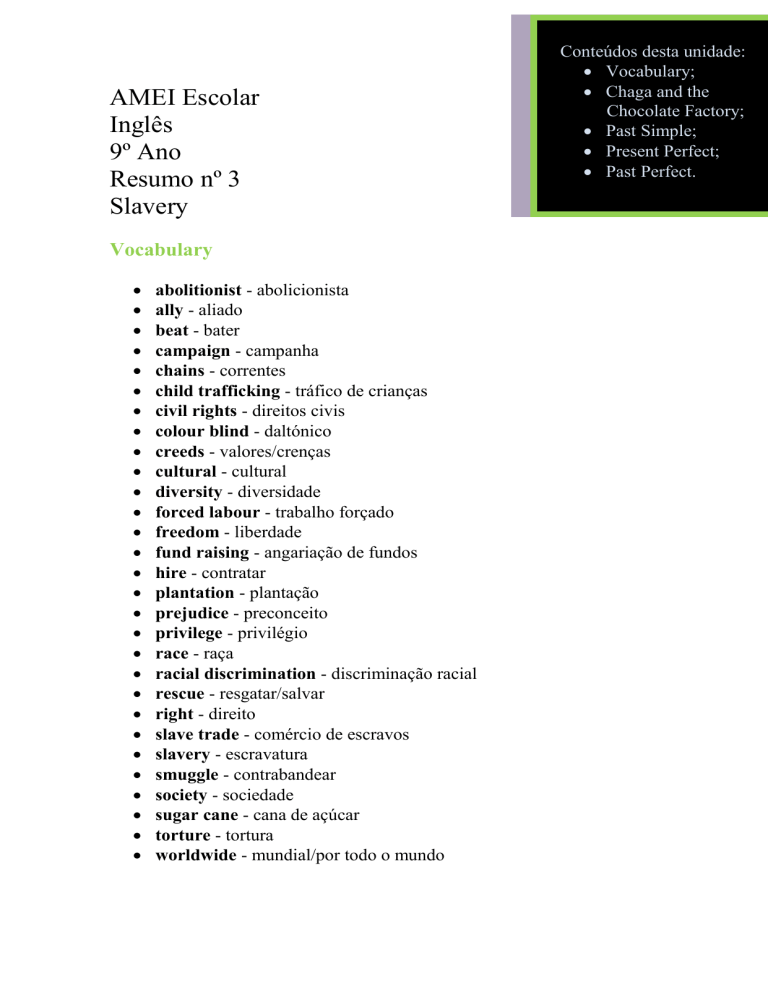
AMEI Escolar
Inglês
9º Ano
Resumo nº 3
Slavery
Vocabulary
abolitionist - abolicionista
ally - aliado
beat - bater
campaign - campanha
chains - correntes
child trafficking - tráfico de crianças
civil rights - direitos civis
colour blind - daltónico
creeds - valores/crenças
cultural - cultural
diversity - diversidade
forced labour - trabalho forçado
freedom - liberdade
fund raising - angariação de fundos
hire - contratar
plantation - plantação
prejudice - preconceito
privilege - privilégio
race - raça
racial discrimination - discriminação racial
rescue - resgatar/salvar
right - direito
slave trade - comércio de escravos
slavery - escravatura
smuggle - contrabandear
society - sociedade
sugar cane - cana de açúcar
torture - tortura
worldwide - mundial/por todo o mundo
Conteúdos desta unidade:
Vocabulary;
Chaga and the
Chocolate Factory;
Past Simple;
Present Perfect;
Past Perfect.
Chaga and the Chocolate Factory
Chaga is a poor ten-years-boy from Mali.
The Bicycle Man promised him to take
him to a place where he would earn money
to help his family and to buy a brand new
bicycle.
Chaga’s parents allowed him to go to the
plantation.
He and other boys were taken to the Ivory
Coast. There he didn’t find his dream but a
nightmare.
Chaga met Bokhari, a boy who has been
there for four years.
The boy told him they had to work for
long hours carrying heavy bags of cocoa
beans, with little food and sometimes there
were beaten.
Chaga and other boys managed to escape
after Bokhari’s death.
Chaga was helped by a policeman and
went back home.
The farm was closed.
Chaga é um pobre menino de 10 anos de Mali.
O Homem da Bicicleta prometeu-lhe que o
levaria para um lugar onde ele pudesse ganhar
dinheiro para ajudar a sua família e comprar
uma nova e moderna bicicleta.
Os pais do Chaga deixaram-no ir para a
plantação.
Ele e outros rapazes foram levados para a
Costa do Marfim. Lá ele não encontrou o seu
sonho mas sim um pesadelo.
Chaga conheceu Bokhari, um rapaz que estava
ali desde à quarto anos.
O rapaz disse-lhe que eles tinham de trabalhar
durante muitas horas carregando pesados sacos
de grãos de cacao, com pouca comida e por
vezes eram agredidos.
Chaga e outros rapazes conseguiram escaper
depois da morte de Bokhari.
Chaga foi ajudado por um policia e voltou para
casa.
A fábrica foi fechada.
Past Simple
O Past Simple usa-se para falar de um acontecimento que começou
e acabou no passado e utiliza-se com as seguintes expressões de
tempo:
yesterday - ontem
last week/summer/... - na semana/verão/... passado(a)
two weeks/six months/... ago - à duas semanas/seis meses/...
atrás
in 2000/1996/... - em 2000/1996/...
when I was 10/I lived in Spain/... - quando eu tinha dez
anos/vivia em Espanha/...
Past Simple of the Verb Talk
Affirmative
Negative
Interrogative
I talked
I didn’t talk
Did I talk?
You talked
You didn’t talk
Did you talk?
He/she/it talked
He/she/it didn’t talk
Did she/he/it talk?
We talked
We didn’t talk
Did we talk?
You talked
You didn’t talk
Did you talk?
They talked
They didn’t talk
Did they talk?
Affirmative
Para formar a afirmativa acresenta-se, geralmente, -ed ao verbo:
Caso
regra geral
verbos terminados em -e
verbos terminados em consoante +
vogal + consoante
verbos terminados em consoante +
-y
verbos irregulares
Resultado
acrescenta-se -ed
Exemplos
talk talked
hunt hunted
acressenta-se somente o -d arrive arrived
duplica-se a consoante
plan planned
final e acrescenta-se -ed
stop stopped
o -y passa a -i,
study studied
acrescentando-se depois ed
têm diferentes terminações do did
be was/were
swim swam
(consulta a ficha de
apoio)
Negative/Interrogative
Para formar a negativa utiliza-se sempre o verbo auxiliar do no Past
Simple e na negativa e o verbo principal no infinitivo.
I didn’t have swimming last year. /She didn’t go to the school yesterday.
Para formar a interrogativa utiliza-se sempre o verbo auxiliar do no
Past Simple e o verbo principal no infinitivo e colocamos o sujeito
entre o auxiliar e o principal.
Did I have swimming last year? /Did she go to the school yesterday?
Present Perfect
O Present Perfect usa-se para falar de acções que tiveram início no
passado e que continuam no presente, falar de experiências, dizer há
quanto tempo alguma acção acontece e por oposição ao Past Simple
(BI - British English - Inglês Britânico).
Dalai Lama has fought for the freedom of his country.
(situação que começou no passado e continua no presente)
Have you been to Australia? Yes, I have been there.
(situação em que se fala de experiências)
He has lived here for ten years.
(situação que indica há quanto tempo a acção acontece)
He has just moved.
(oposição ao Past Simple)
O Present Perfect utiliza-se com os seguintes advérbios e expressões
de tempo:
already - já
yet - ainda
still - continuo
ever - alguma vez
just - agora mesmo
for - há
since - desde
never - nunca
...
Have you ever been in England?
Yes, I have already been there.
No, I have never been there. (o verbo não pode estar na negativa)
No, I haven’t been there yet.
No, I still haven’t been there.
Yes, but I haven’t gone there for six years.
Yes, but I haven’t gone there since last summer.
Present Perfect of the Verb Study
Affirmative
Negative
Interrogative
I have studied
I haven’t studied
Have I studied?
You have studied
You haven’t studied
Have you studied?
He/she/it has studied He/she/it hasn’t studied Has he/she/it studied?
We have studied
We haven’t studied
Have we studied?
You have studied
You haven’t studied
Have you studied?
They have studied
They haven’t studied
Have they studied?
Affirmative
Para formar a afirmativa do Present Perfect utilizamos o verbo
auxiliar have seguido do verbo principal no Past Participle.
sujeito + have/has + verbo principal no Past Participle
I have been
She has played
Negative/Interrogative
Para formar a negativa do Present Perfect utilizamos o verbo auxiliar
have na negativa seguido do verbo principal no Past Participle.
sujeito + haven’t/hasn’t + verbo principal no Past Participle
I haven’t been
She hasn’t played
Para formar a interrogativa do Present Perfect utilizamos o verbo
auxiliar have seguido do sujeito e do verbo principal no Past
Participle. Nas perguntas podem também estar presente o pronome
interrogativo e o advérbio ever.
(question word) + have/has + sujeito + (ever) + verbo principal no Past Participle
Have I been...?
Has she played...?
Have I ever been...?
Why has she played...?
Past Perfect
O Past Perfect usa-se para falar de uma acção que ocorreu no
passado anterior a outra acção que ocorreu igualmente no passado e
utiliza-se em confronto com o Past Simple.
When I arrived at the airport, the plane had left.
O Past Perfect utiliza-se com os seguintes advérbios e expressões de
tempo:
always - sempre
only - só
already - já
yet - ainda
still - continuo
ever - alguma vez
just - agora mesmo
...
Marta had never watch that TV show before that episode.
I had always brought my umbrella before yesterday.
I hadn’t only learnt Spanish when I went to Spain in the holidays.
When I went to the station the train had yet arrived.
Past Perfect of the Verb Study
Affirmative
Negative
Interrogative
I had studied
I hadn’t studied
Had I studied?
You had studied
You hadn’t studied
Had you studied?
He/she/it had studied
He/she/it hadn’t studied Had he/she/it studied?
We had studied
We hadn’t studied
Had we studied?
You had studied
You hadn’t studied
Had you studied?
They had studied
They hadn’t studied
Had they studied?
Affirmative
Para formar a afirmativa do Past Perfect utilizamos o verbo auxiliar
have no Past Simple seguido do verbo principal no Past Participle.
sujeito + had + verbo principal no Past Participle
I had been
She had played
Negative/Interrogative
Para formar a negativa do Past Perfect utilizamos o verbo auxiliar
have na negativa e no Past Simple seguido do verbo principal no
Past Participle.
sujeito + hadn’t + verbo principal no Past Participle
I hadn’t been
She hadn’t played
Para formar a interrogativa do Past Perfect utilizamos o verbo
auxiliar have no Past Simple seguido do sujeito e do verbo principal
no Past Participle. Nas perguntas podem também estar presente o
pronome interrogativo e o advérbio ever.
(question word) + had + sujeito + (ever) + verbo principal no Past Participle
Had I been...?
Had she played...?
Had I ever been...?
Why had she played...?

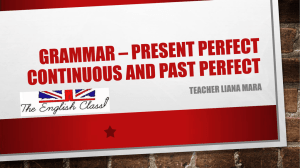
![[1] 22 Data Turma PROFESSOR / DISCIPLINA CONTEÚDO](http://s1.studylibpt.com/store/data/003113195_1-325d5632c38bd4fd4c0c1e89af27ac20-300x300.png)
